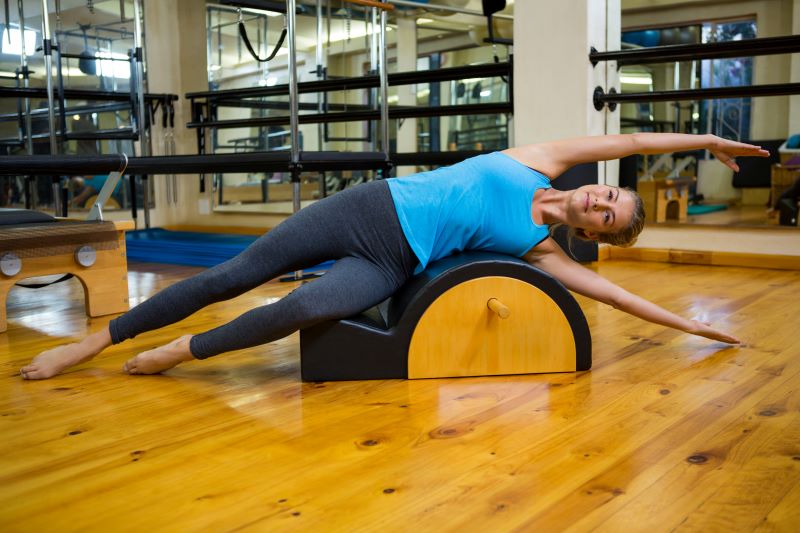15 Best Exercises & Workouts Helpful in PCOS Problems

While medical science has been improving recently, medication might sometimes be the only way to cure and treat every disease. Instead, accompanying these with exercising and working out can help you recover faster. PCOS is one such hormonal condition that can be treated with daily exercise.
Are you confused about the best exercises to control PCOS? This article provides a compilation of exercises you can easily practise at home.

Table of Contents

What is PCOS (Polycystic Ovary Syndrome)?
Polycystic Ovary Syndrome (PCOS) is a medical condition that mainly affects women of reproductive age. It causes an imbalance of reproductive hormones, resulting in the following issues.
Increased blood cholesterol levels
High blood pressure
Sleep apnoea
Increases the risks of pregnancy complications
Women suffering from PCOS are always advised to take physical activities seriously. Besides medical treatment, exercising and working out help recover faster from this condition.
What are the Causes of PCOS?
Clinical researchers do not know the exact causes of PCOS. In the majority of cases, however, the patients have high insulin resistance. Thus, when insulin levels build up in such women's bodies, it can cause higher androgen levels, which can trigger PCOS. Moreover, obesity is also known for triggering insulin levels, which can ultimately result in PCOS.
- Hormonal Imbalance: PCOS is characterised by hormonal imbalance, which, in particular, causes high levels of male hormones like androgens such as testosterone that can interfere with the menstrual cycle, leading to symptoms such as an irregular period and acne.
- Insulin Resistance: Insulin resistance is often seen in many patients with PCOS. This condition happens when human cells are not responsive to insulin, thus increasing sugar levels in the blood. Insulin resistance also leads to weight gain, difficulty losing weight, and increased risk of type 2 diabetes.
- Genetics: There is evidence suggesting that genetics play a part in the development of PCOS. Family characteristics usually show that one’s family has a history of the ailment, making it probable for an individual to have imbalances related to these components.
- Obesity: Often associated with PCOS is obesity, which occurs mostly around the abdomen. The case might worsen if one is obese because overweight individuals may become resistant to insulin or acquire abnormal hormone levels, thereby complicating diagnosis and enhancing the likelihood of diabetic conditions together with heart attacks.
- Inflammation: Chronic low-grade inflammation can alter hormone levels and contribute to insulin resistance, and it may be involved in developing PCOS. Certain medical conditions, diets, and sedentary lifestyles can all cause inflammation.
- Factors Related to Lifestyle: A balanced diet, frequent exercise, and stress-reduction practices can all contribute to a healthy lifestyle that can lessen PCOS symptoms and lower the likelihood of complications.
Symptoms of PCOS
Here are some common symptoms that are seen in women suffering from PCOS.
Missed or irregular periods
Excessive body hair
Acne or oily skin
Large ovaries or cysts in ovaries
Infertility
Small parts of excess skin in armpits and neck
Dark skin patches on the back of the neck, under the breasts and in the armpits
Baldness or thinning hair
15 Best Exercises for PCOS Patients
Do you want to find the right physical exercises to recover from Polycystic Ovary Syndrome? The following list can help.
Cardio Exercises for PCOS
It is essential to keep your heart pumping when suffering from PCOS. Cardiovascular workouts can help you with this. Apart from walking, swimming is the most common one. If you know how to swim, you can push yourself to set distance and speed goals once or twice weekly. It will help you stay energetic and in the right shape.
Moreover, if you have a knack for these activities, you can also try aerobics and dancing. Cycle riding can also be beneficial for cardio. These light exercises can help you maintain regular physical activities while dealing with PCOS.
1. Walking

Even if you lack time or energy to do anything else, walking is an exercise that one can do easily. A daily 5-minute walk can also contribute to controlling your symptoms and complications of PCOS. The best time to do this is in the morning. High-paced walking or jogging will give you better results in a short time.
2. HIIT Workouts

High-intensity interval training (HIIT) is also important for PCOS problems. It involves an intense exercise and workout routine with regular intervals of rest. In this regard, you can include exercises like burpees, tuck jumps, and mountain climbers.
It aims to boost the outcomes of cardio with heavier workout routines. Most people consider it an efficient way of maintaining heart health and a healthy weight. It also aids in improving insulin resistance faster.
3. Swimming

Swimming is an excellent full-body workout that is gentle on the joints, making it ideal for individuals with PCOS. It provides cardiovascular benefits while also toning muscles and improving flexibility. Additionally, swimming allows for varying intensity levels, making it suitable for individuals of all fitness levels to incorporate into their exercise routine.
4. Aerobics

Aerobic exercises, such as high-energy dance routines or step aerobics classes, offer a fun and effective way to improve cardiovascular health and burn calories. These exercises elevate heart rate and promote oxygen circulation throughout the body, helping to improve endurance and stamina over time. Aerobics classes often incorporate music and choreography, making them engaging and motivating for participants.
5. Dancing

Dancing is a great way to have fun and express yourself and a fantastic cardio workout. Whether it's salsa, hip-hop, or ballroom dancing, moving to the rhythm helps elevate your heart rate and burn calories. Dancing also improves coordination, balance, and flexibility, making it a holistic exercise option for individuals with PCOS looking to improve their overall fitness levels.
6. Cycling

Whether outdoors or on a stationary bike, cycling is a low-impact cardio exercise that can be easily adapted to different fitness levels. It strengthens the lower body muscles, including the quadriceps, hamstrings, and calves, while providing a cardiovascular workout. Cycling is a convenient and enjoyable way to incorporate cardio exercise into your routine, whether as a mode of transportation or leisure activity.
Strength Training for PCOS
Use strength training exercises tailored for individuals with PCOS to build muscle, improve metabolism, and enhance overall physical resilience. Incorporating resistance training routines can effectively manage weight, reduce insulin resistance, and promote better hormonal balance.
7. Light Weight Training

Since women with PCOS have high androgen levels, they tend to build muscles quickly. In addition, this results in greater muscle strength and weight gain issues and complications. It is, therefore, better to avoid such a situation by burning the extra calories. To do this, consider lightweight training at least twice a week.
8. Bodyweight Exercises

Bodyweight exercises are highly practical for building strength and muscle tone without additional equipment. Examples include push-ups, squats, lunges, and planks, all utilising your body weight as resistance.
These versatile exercises can be modified to suit different fitness levels, making them accessible for individuals with PCOS looking to improve their strength and overall physical health.
9. Resistance Band Exercises

Incorporating resistance band exercises into your routine can effectively target various muscle groups while providing low-impact resistance. Exercises such as bicep curls, lateral raises, and tricep extensions with resistance bands offer a versatile and accessible strength training option for PCOS patients.
Flexibility and Balance Exercises for PCOS
Enhance flexibility, stability, and coordination with targeted exercises designed to address the unique needs of individuals with PCOS. Incorporating balanced workouts into your routine can improve posture, reduce the risk of injury, and promote holistic well-being for individuals managing PCOS symptoms.
10. Aqua Aerobics or Zumba

Pool workouts have gained popularity recently. These are relaxing and helpful at the same time if you are recovering from PCOS. Aqua aerobics, or Zumba, has been popular among women. These light and fun exercises help women with PCOS avoid gaining unnecessary weight while also carrying out their physical workouts.
11. Core Strength

If your weight is more than ideal, there is a chance of getting frequent pain in the lower back. It can cause further complications to your PCOS problems. Training for core strength can help you avoid such issues. These muscles support your spine, and their strengthening helps improve your overall posture.
Women with PCOS trying to conceive can perform exercises which improve core strength and bring endurance to the pelvis, legs, and upper abdomen. Improving the core strength in these muscles will help support a healthy pregnancy.
12. Stability Disc Exercises

Utilising stability discs, also known as balance discs, can enhance balance, stability, and proprioception. Exercises performed on stability discs, such as single-leg squats, lunges, and standing balance drills, challenge core stability and lower body strength while improving overall balance and coordination.
Stability disc exercises provide a dynamic and engaging way to improve flexibility and balance for individuals with PCOS.
Mind-Body Exercises for PCOS
The link between body and mind is evident in recent clinical research. Women having a healthy mental condition are likely to recover from PCOS easily. Moreover, it allows a prompt response to stress and anxiety without having to deteriorate physical or mental health.
Such exercises mainly include yoga, pilates, and tai chi. These can not only help burn calories but also largely reduce mental stress and anxiety. Therefore, these exercises are a one-stop solution for most of your PCOS symptoms and complications.
13. Yoga

Yoga involves a series of postures, breathing exercises, and meditation techniques aimed at promoting physical and mental well-being. It helps reduce stress, improve flexibility, and enhance overall mindfulness, making it beneficial for individuals with PCOS who may experience symptoms exacerbated by stress.
14. Pilates

Pilates focuses on strengthening the core muscles, improving flexibility, and enhancing body awareness through controlled movements and breathing patterns. It emphasises proper alignment and balance, making it suitable for individuals with PCOS seeking to improve posture and overall physical function.
15. Tai Chi

Tai Chi is a gentle form of martial arts that combines slow, flowing movements with deep breathing exercises. It promotes relaxation, reduces stress, and improves balance and coordination. Tai Chi can be particularly beneficial for individuals with PCOS looking to manage symptoms related to hormonal imbalances and stress.
Types of Equipment Required for PCOS Exercises
Certain PCOS exercises require specific equipment to enhance their effectiveness and safety. This table lists exercises requiring equipment, ensuring PCOS patients are well-prepared for a comprehensive workout routine.
Exercise |
Required Equipment |
| Swimming | Swimming pool |
| Cycling | Stationary bike or bicycle |
| Light Weight Training | Dumbbells, barbells, or weight machines |
| Resistance Band Exercises | Resistance bands |
| Aqua Aerobics or Zumba | Pool (for Aqua Aerobics) |
| Stability Disc Exercises | Stability discs |
| Yoga | Yoga mat |
| Pilates | Yoga mat, Pilates equipment (optional) |
Benefits of Exercise for PCOS Patients
Exercise for PCOS problems can help control and reduce the complications of PCOS. You will experience the following benefits from regular exercise and working out as a patient.
1. Maintains a Healthy Weight
Excess fat and weight above the ideal standard can worsen PCOS symptoms and complications. Doing regular exercise becomes even more helpful and effective for women with PCOS as it helps them lose weight while maintaining a healthy diet.
2. Helps Reduce Cholesterol
Women suffering from PCOS usually have high levels of cholesterol and triglycerides in the blood. These levels can cause metabolic syndrome. While there may be medicines for this, proper exercise and diet can help reduce these levels quickly.
3. Helps to Maintain a Healthy Insulin Level
As discussed, women suffering from PCOS face the difficulty of insulin resistance. Regular cardio exercise helps your body respond to insulin in an improved manner. It lowers your risk of developing diabetes or any other diseases.
4. Boosts Sleep Pattern
Regular physical activities tire your body, helping you sleep better at night. Women suffering from PCOS often face sleep apnoea issues, snoring, and insomnia. Having a good sleep routine is essential. Exercising daily will help you get better and deeper sleep to resolve these issues.
5. Improves Heart Health
PCOS increases the risks of cardiovascular diseases in women. They usually develop atherosclerosis, high blood pressure, and high cholesterol. However, regular exercising strengthens the heart muscles, lowering the risks of developing such conditions.
6. Regulates and Maintains Hormones
Excess fat in the body often creates an imbalance of hormones, which can trigger PCOS. Reducing these with regular exercise and working out will help you manage and regulate your hormones. Naturally, you will be able to control your PCOS symptoms.
What are the Exercises to Avoid for PCOS Patients?
While HIIT is considered one of the best workouts for PCOS, patients need to be cautious regarding the extent of the workout. For instance, if you attempt an intense workout that is not ideal for your body, you might worsen the PCOS symptoms and complications.
Some exercises to avoid if suffering from polycystic ovary syndrome (PCOS) are:
- High-Intensity Cardio: These include running or jumping exercises involving repetitive high-impact movements. These exert too much stress on the joints and can worsen conditions like joint pain and inflammation, particularly for people with PCOS.
- Heavy Weightlifting: However, for PCOS patients, there is a caveat; it is necessary to consider lighter weights as opposed to extremely heavy ones with a focus on proper technique to avoid unnecessary strain they might cause their muscles and joints with poor form.
- Extreme Endurance Training: Prolonged periods of endurance activities such as marathon running or intense cycling can increase cortisol levels, increasing body stress levels, thereby aggravating symptoms of fatigue in PCOS patients.
- Over-Exertion: Excessive exercise volume or intensity resulting in pushing the body beyond its limits can lead to fatigue, burnout and increased cortisol levels that may disrupt hormone balance and overall well-being in individuals suffering from PCOS.
- Too Much Exercise Without Rest: The absence of sufficient recovery time after workouts prevents the body from appropriately repairing itself or adapting to exercise stress, thus raising the chances of overtraining syndrome, exacerbating tiredness seen in PCOS sufferers.
A constant effort to avoid fat accumulation can be perceived as self-imposed stress from an external attack by your body. It will cause the hormones to react aggressively. Extreme weight lifting or constant push-ups can trigger such conditions in PCOS patients.
What are the Safety Precautions to Take?
Therefore, it is always advisable to seek professional training and sessions from fitness professionals. Moreover, you should seek help from your doctor regarding your physical condition before choosing your workout routine.
Apart from that, it would help if you were in constant touch with the physicians and gym trainers. If you feel any physical or mental hazards, consult them to check if exercising might be causing these issues. In such cases, reduce the intensity of your workout routine.
Disclaimer: Practise the above-mentioned exercises under the supervision of a trained practitioner and consult a doctor beforehand to ensure your body is fit enough to perform the required moves/postures.
In conclusion, incorporating specific exercises into your routine can significantly help manage PCOS. Activities like cardio, strength training, and yoga effectively improve insulin sensitivity, promote weight loss, and reduce stress. Regular physical activity helps alleviate symptoms and enhances overall health and well-being.













